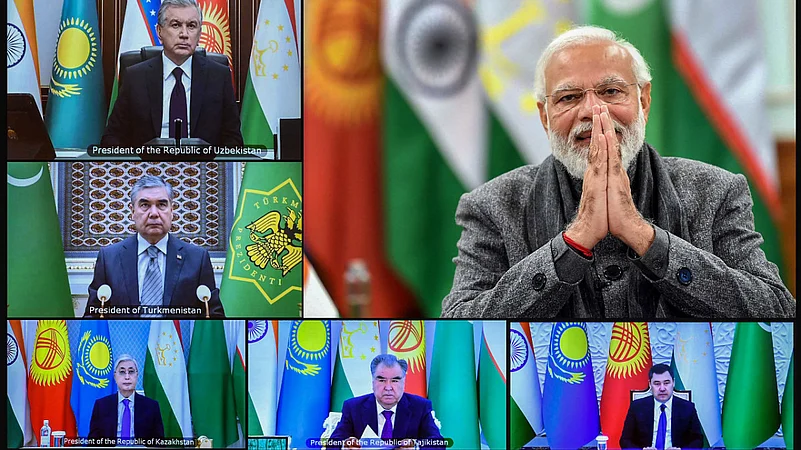If it were not for the Omicron wave that has swept through the country, leaders of the five Central Asian countries would have been here as guests of honour for India’s Republic Day celebrations. Making the best of the situation, Prime Minister Narendra Modi held a virtual summit with heads of Kazakhstan, Uzbekistan, Tajikistan, Turkmenistan and the Kyrgyz Republic a day later on Thursday. This is the first time, such a high-profile conversation with all five heads was called by the Prime Minister, signifying India’s growing focus on its extended neighbourhood. Intensive engagement with Central Asia will serve India’s strategic, political and economic interests.
But Chinese President Xi Jinping stole Modi’s thunder by organizing a similar virtual summit two days ahead to celebrate 30 years of establishing diplomatic relations between China and its five Central Asian neighbours. According to a report in the Global Times, Xi put forward five proposals to define China’s ties with Central Asia. These are "to magnify the exemplary role of good-neighbourly friendship, to build a cooperation belt for high-quality development, to strengthen the shield for defending peace, to build a family with diverse interactions, and to protect the global village that enjoys peace and development.’’
Central Asian countries came into the national limelight, thanks mainly to the Taliban take-over of Afghanistan last August. But successive Indian governments had realised the potential of engaging with Central Asia. The efforts that began after the Central Asian nations became independent entities, did not go far mainly due to the problems of connectivity. To his credit, Prime Minister Modi pushed for closer ties. He visited all five Central Asian countries in 2015. India-Central Asia Dialogue began in 2019. His National Security Adviser Ajit Doval, invited all Central Asian security chiefs to a meeting on Afghanistan last November. Foreign minister Subramanyam Jaishankar visited the region several times last year for the Heart of Asia Dialogue as well as Shanghai Co-operation meetings. India’s official engagement with the region has been steadily rising and leading up to a virtual conversation at the highest political level.
Prime Minister Modi set the ball rolling with his opening remarks where he laid down India’s three main objectives. "First, to make it clear that cooperation between India and Central Asia is essential for regional security and prosperity. From the Indian point of view, I would like to emphasise that Central Asia is central to India’s vision of an integrated and stable extended neighbourhood,’’ Modi said. Second, he wanted to give an "effective structure to our cooperation’", and third to create a road map for future cooperation.
Summit level meetings will now be held every two years in different countries. The next summit is scheduled for 2024, though details of where it will be hosted will be worked out later. Foreign ministers of India and the five nations meet through the India-Central Asia Dialogue, now there will be similar meetings at regular intervals of the Trade and Culture ministers of all five nations. An India-Central Asia Centre will be set up in New Delhi.
Getting the right equation with government leaders is essential but without robust economic relations, ties tend to flag. India’s major hindrance is connectivity with this land-locked region. Central Asian countries are rich in oil, gas, uranium and minerals. The world’s attention is shifting sharply to the region where a new 21st century Great Game between rival powers will play out. As part of the former Soviet Union, Russia remains the big Daddy of Central Asia. China too, with its ambitious Belt and Road Initiative, its chequebook diplomacy is gaining ground. In fact, Xi Jinping announced his grand plans to revive the ancient silk route during a visit to Kazakhstan in 2013. China has access to a 3300-km border with Central Asia. So, China has spread out all across the region building infrastructure and establishing connectivity through this backward but rich region. China is a major presence now in Central Asia. While Russia provides net security, China doles out the cash. Turkey too and Pakistan are stepping in while the US has abandoned its listening posts in Afghanistan is jostling for play in Central Asia.
"For India, Central Asia provides a great opportunity, it is time for India to wake up and seize it,’’ said PS Raghavan a former ambassador to Russia and with expert knowledge of Central Asia. He believes the region is about to take off in a big way and India can play a major role. He points to what happened in the Gulf region, 30-years ago. Initially, it was mainly a destination for the working class, but in the last couple of years Indian IT professionals, bankers, engineers, hoteliers, doctors are all in the Gulf. And now India also has excellent political ties with all regions ruling families. Raghavan believes it is time for New Delhi to take a fresh look at Central Asia and start working and invest time and energy to get there ahead of the economic boom. But the question remains can India compete with a China which is already firmly established in Central Asia.



























